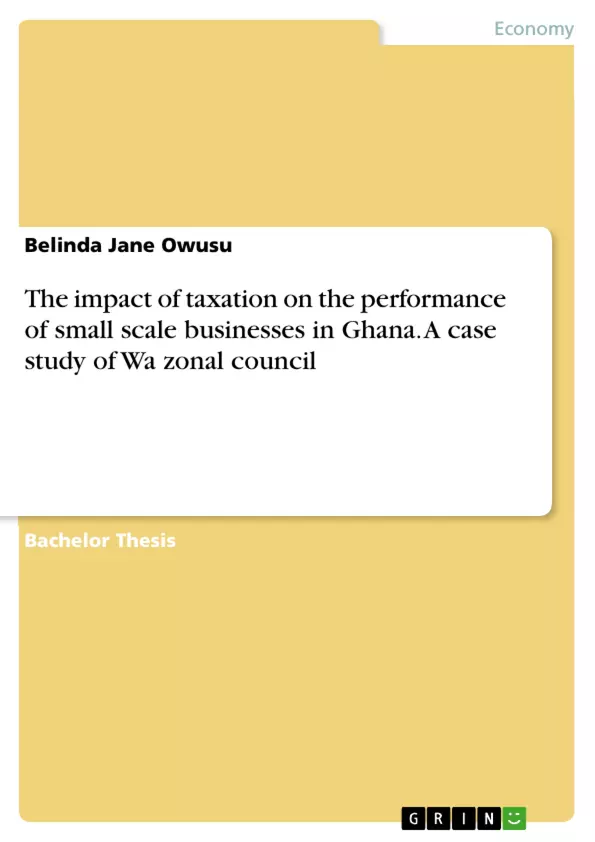The research was carried out in Wa Zonal Council, within the Wa Municipal District in the Upper West Region of Ghana. The main objective was to ascertain the impact of taxation on the performance of small-scale businesses in the study area. Questionnaires, interview guide and observation were used in getting primary data on the field and a sample of eighty (80) respondents from among two strata were randomly selected after being stratified into common groups. Percentage, frequency charts, and n using the Statistical Package for Social Sciences (SPSS) and Microsoft Excel were the methods used in analyzing the data.
Inhaltsverzeichnis (Table of Contents)
- CHAPTER ONE
- INTRODUCTION
- Background of the Study
- Statement of the Problem
- Significance of the Study
- Purpose of the Study
- Objectives of the Study
- Research Questions
- Scope of the Study
- Subject Scope
- Geographical Scope
- CHAPTER TWO
- LITERATURE REVIEW
- Introduction
- Definition of Small-scale Enterprise
- Types of Small-scale Businesses
- Characteristics of Small-scale Enterprise
- Some Common Features of Small Scale Enterprises in Ghana
- Contribution of the Small-scale Enterprise
- What is Tax
- The Concept of Taxation
- Forms of Taxes
- Objectives of Taxation
- Tax Policies
- Identification of Tax Payer
- Fines and Penalties
- Methods of Taxing the Small Scale Business
- Administering Small Business Taxation
- CHAPTER THREE
- METHODOLOGY
- Introduction
Zielsetzung und Themenschwerpunkte (Objectives and Key Themes)
This dissertation investigates the impact of taxation on the performance of small-scale businesses in Ghana, using a case study of the Wa Zonal Council. The study aims to identify key tax-related challenges faced by these businesses and assess the effectiveness of existing tax policies and administration in supporting their growth and development.
- Impact of taxation on small-scale business performance
- Tax-related challenges faced by small-scale businesses
- Effectiveness of tax policies and administration in Ghana
- Role of taxation in promoting the growth and development of small-scale businesses
- Recommendations for improving tax policies and administration to support small-scale businesses
Zusammenfassung der Kapitel (Chapter Summaries)
Chapter One: Introduction presents the background of the study, outlining the significance of small-scale businesses in Ghana's economy and highlighting the need to understand their relationship with taxation. It defines the problem, stating the limited research on the impact of taxation on the performance of small-scale businesses in Ghana. The chapter also discusses the study's objectives and research questions, outlining the scope of the research.
Chapter Two: Literature Review delves into existing literature on small-scale businesses, taxation, and their intersection. It defines small-scale enterprises, explores their characteristics and contribution to the economy, and provides an overview of the concept of taxation, its forms, objectives, and policies. The chapter examines methods of taxing small-scale businesses and discusses challenges associated with administering these taxes.
Chapter Three: Methodology outlines the research design, data collection methods, and data analysis techniques employed in the study. It explains the rationale behind the chosen methodology and addresses ethical considerations.
Schlüsselwörter (Keywords)
The main keywords and focus topics of this dissertation include small-scale businesses, taxation, performance, Ghana, Wa Zonal Council, tax policies, tax administration, challenges, and recommendations.
Frequently Asked Questions
What is the impact of taxation on small businesses in Ghana?
The study investigates how tax policies and administration affect the performance and growth potential of small-scale enterprises in the Wa Zonal Council.
What are the common features of small enterprises in Ghana?
Small businesses in Ghana are crucial for the economy, often characterized by limited capital, local operation, and high vulnerability to tax changes.
What challenges do small businesses face regarding tax administration?
Challenges include complex tax policies, identification of taxpayers, and the burden of fines and penalties for non-compliance.
How was the data for this study collected?
The researcher used questionnaires, interview guides, and observations, analyzing a sample of 80 respondents using SPSS and Microsoft Excel.
What are the objectives of taxation for the government?
Taxation aims to generate revenue for public services, regulate the economy, and promote social development through redistribution.
- Quote paper
- Belinda Jane Owusu (Author), 2017, The impact of taxation on the performance of small scale businesses in Ghana. A case study of Wa zonal council, Munich, GRIN Verlag, https://www.grin.com/document/1270174



